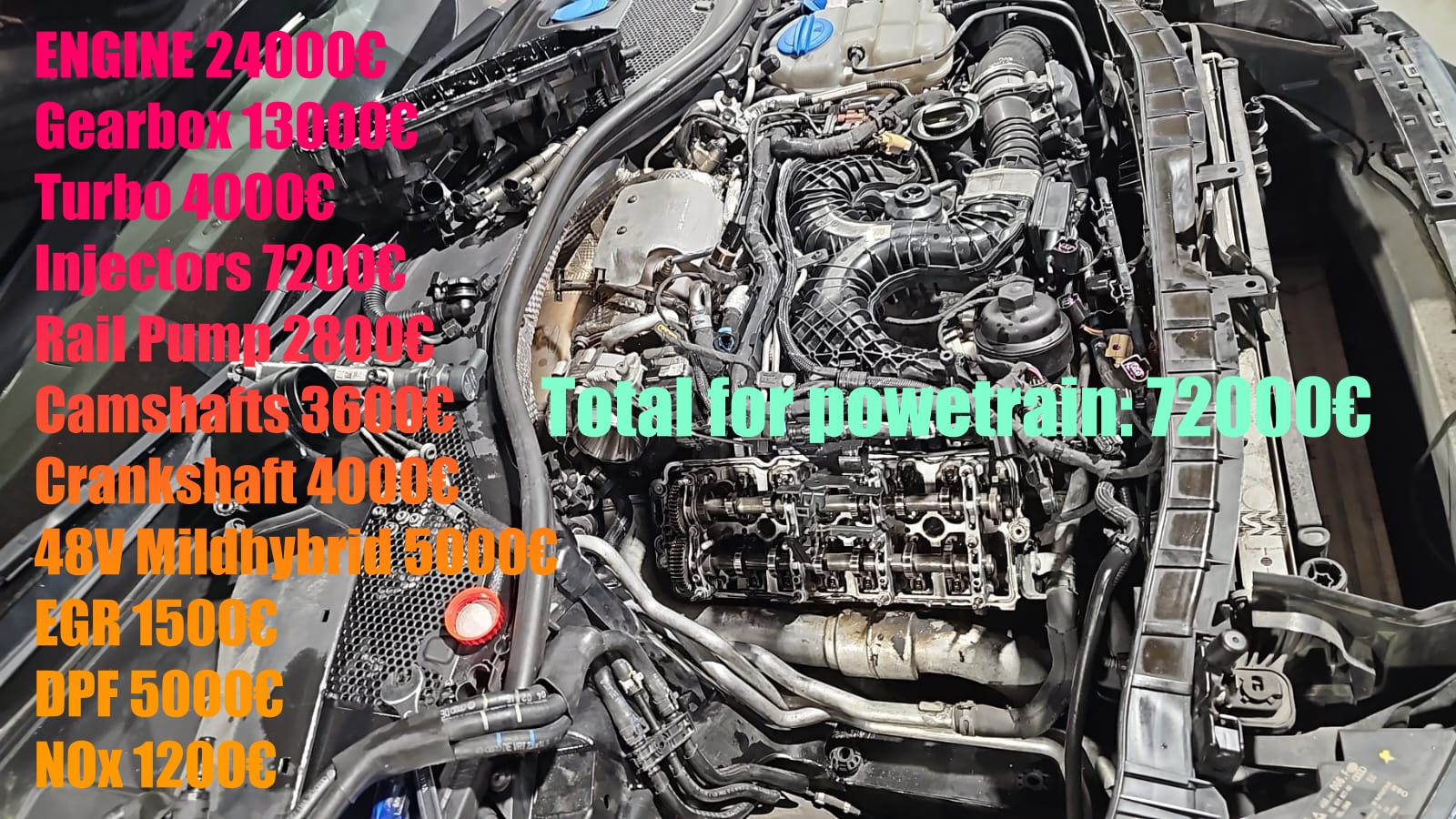
Audi EPC catalog prices : Motor 24000 EUR – Transmission 13000 – Camshaft 3600 – NOx 1200 – DPF (Diesel Particulate Filter) 5000 – Turbine 4000 – EGR (Exhaust Gas Recirculation) 1500 – CR Pump (Common Rail Pump) 2800 – Injectors 7200 – Crankshaft 4000 – Mildhybrid 48V Battery 2800 – Alternator 2200 = Consumable parts over 100,000 km amount to 71300 EUR.
What we have been warning about for years, with 14 years of experience, is that “cheaper” fossil fuel vehicles are generally more expensive than electric vehicles (EVs), at least twice as expensive. This is a topic that we knew about and warned about from various sources (not just our work) including tuners and technicians from authorized Porsche Interauto service centers, that new fossil fuel vehicles are garbage. They are made of low-quality materials, weakened materials, overly complicated solutions, programmed failures, and excessively expensive parts. The 3.0 TDI engines that have been installed, if I’m not mistaken, since 2014, meaning 10 years ago, how is it possible that this same garbage has never been called out, questioned, or reported on? How is it possible that this semi-finished product garbage was sold for almost 10 years, and the general public only found out about the problem when it affected them personally? The answer lies literally in every possible article from Revijahak, Autoportal, Jutarnji, Auto Klub, Start Shitnews, Index Auto, and other portals whose opinions are smeared to be superficial. Only electric vehicles (EVs) are criticized for every detail, while garbage from fossil fuel vehicles doesn’t even get a recall, let alone a part revision, for the most serious mistakes. The cost of each part in a new car is only questioned when it comes to what they hate and want to subjectively misinform the public about – the cost of EV batteries. They don’t know the cost of any individual gasoline or diesel engine part in those vehicles they praise, which is basically more expensive than the ENTIRE EV (exactly what they claim about EVs). They praise them because they are paid, and if they criticize, they don’t get “exclusive” access to new models for test drives. So, if you wonder why fossil fuel vehicles are becoming more and more garbage, the main culprits are automotive destroyers – journalists who sell propaganda for sales by praising something they have no idea about how it works. “Šebalji,” Ilko the auto-fascist from automobili.hr, Index journalists, Jutarnji, and other propagandistically destructive cartels are responsible for the state of terrible quality in the automotive sector. An ordinary faithful lover of metal toys has nowhere to get information about EVs or fossil fuel vehicles.
So after all these years of listening to journalistic automotive fascism and discrimination against topics that are not lubricated for them, we can conclude that there is a significant lack of an independent and unbiased audience directed by ordinary users and very crucial mechanics who are a neglected link and voice in informing owners. Mechanics with experience have been deprived of the right to speak; journalists and self-proclaimed “car enthusiasts” have taken that away and are in the process of demonizing mechanics as “scammers.” We almost don’t have a media platform with real criticism of garbage, low-quality, and expensive engines, programmed failures. Only colleague Bagrameli expresses these issues with years of experience faithfully conveying topics from the fossil fuel perspective. Mechanics with their experience should be proud of that part of the automotive industry.
Audi missed the mark with their new diesel models since 2012, from the high-pressure pump that starts to flake off, and the repair costs 10,000 euros on the 2.0 TDI, to the complete 3.0 TDI engine where they placed a spring in the camshaft to tension the gear that disintegrates as early as 50,000 km. Reported semi-finished product engine codes are CRT CUA CZV DEWA. In addition, the engine is so poorly constructed that after an oil change, an air pocket remains on the pressure valve or oil pressure regulation sensor that can break the entire engine block. The crankshaft, camshaft, oil system, 48V generator, 48V Li-Ion battery… every component is like gold dust on this engine. The majority of these vehicles face very expensive problems already at 50,000 km, where a vehicle with 200 kW should only drive at 50 km/h and with ballet slippers on the feet to penetrate only 5% of the gas pedal to preserve the engine to last 100,000 km. It’s sad that one wonders what’s wrong with the German auto industry and where is the critical voice to stop this. Realistically, people will switch to EVs simply because they have no alternative, even without any (as flat earthers would say) coercion. Those powertrains have have early issue with complete engine before 100k km and costs which owners pay are around 28000€.
These vehicles are so risky that even simple oil change services, where the poorly designed engine can blow out the engine block, will result in blaming the mechanic, as it usually happens. Owners have started to harass mechanics with invented expensive problems, “it wasn’t like this when I came,” so there are fewer and fewer mechanics and services willing to work on these vehicles. It’s less of a hassle to replace the battery on an EV than to do a small service on an Audi diesel CRT engine.
Therefore, it is certain that fossil fuel vehicles have dug their own grave with poor quality. Those who drive them and charge once for subpar parts will realize that even the battery on a Tesla, costing 20,000 euros, is cheaper than diesel trash. We have been working on and servicing them for years, and we switched to EV primarily because of wasting money on oil, and the last straw was the poor quality of the engine and increasingly expensive maintenance parts. So, dear audience, the EV battery is 4 times cheaper than a fossil fuel engine.






























